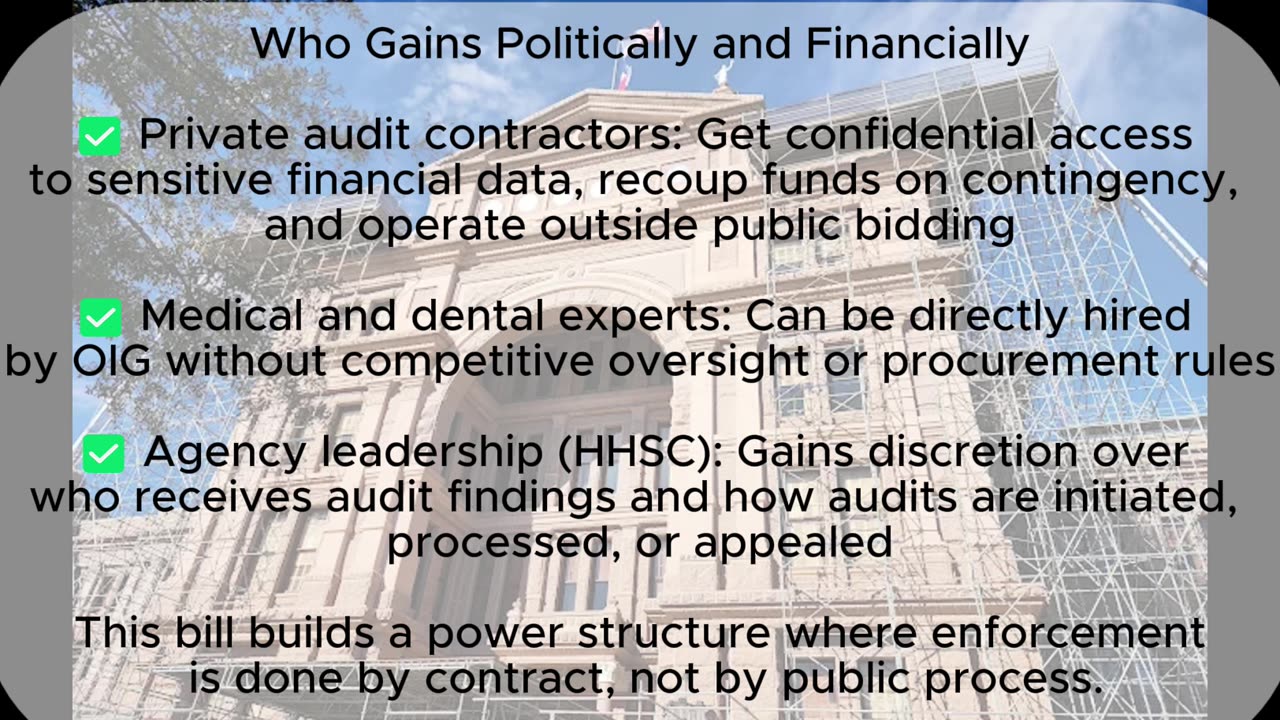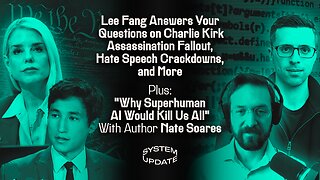Premium Only Content

HB 142
"🔴 HB 142 ... A Quiet Restructuring of Fraud Enforcement That Puts Public Oversight at Risk
On paper, HB 142 looks like an update to the Office of Inspector General (OIG) inside Texas Health and Human Services. The goal? Streamline how they investigate Medicaid fraud. That’s the promise...and for folks tired of delays or bureaucracy, it might even sound overdue.
But read closer, and HB 142 doesn’t just modernize processes. It rewrites how power moves inside one of the most sensitive agencies in the state.
Here’s what it actually does:
🧾 It lets the OIG hire outside “expert witnesses” without using competitive bidding or public procurement rules. These are paid contractors, often used to support audits or investigations...but now they can be chosen directly, with no transparency on price, process, or ties to the agency.
📂 It allows the OIG to share internal findings and data with “a person authorized by the office.” That’s the actual language. No requirement that the person be a public agency, prosecutor, or even under confidentiality rules. There’s no tracking system, no external review, and no public record of where that information goes.
🔍 It repeals the legal requirement that the state randomly audit a sample of Medicaid claims every year. That audit helped catch fraud patterns early. Now, it's gone...leaving the system more reactive, less preventative, and more discretionary.
📉 It hands more enforcement power to third-party audit firms...contractors paid to find overpayments or errors in Medicaid billing. But these audits are confidential, and appeals may be handled by private administrators, not public agencies. Providers may never see who’s making decisions...or how.
And here's the quiet maneuver most folks will miss:
⚠️ The bill says HHSC only has to implement these changes if funds are appropriated. Otherwise, it can do so “to the extent practicable.” Translation: permanent power shifts, with no guarantee of funding...and no sunset clause if the program fails.
So who benefits?
✅ Private audit firms, who now have more power and less scrutiny.
✅ Agency heads who want broader authority without legislative checks.
✅ Contractors who can be hand-picked as “experts” without having to win a bid.
And who gets left out?
❌ Providers...especially small or rural ones...who now face audit consequences with fewer safeguards.
❌ Patients, who rely on a Medicaid system that's becoming harder to monitor from the outside.
❌ The public, which loses insight into how Medicaid fraud is investigated, who’s accused, and who’s profiting from enforcement.
Why this matters:
HB 142 shifts power inward. It builds a model where audits are outsourced, oversight is internalized, and enforcement discretion is held tightly by a few decision-makers. There’s no external audit path. No public bidding. No clear data protection.
It’s part of a growing trend: use “fraud prevention” to justify privatization, discretion, and data secrecy. We’ve seen this playbook before...in education, criminal justice, and now health care enforcement.
Bottom line?
HB 142 lets private contractors and appointed officials control investigations that impact billions in Medicaid spending...without the public ever seeing how those decisions are made. And it does it quietly, under the banner of efficiency.
Watch the silence. That’s where the power moved.
Quick ask, y’all...likes help the algorithm, but shares are what get the truth out.
If this bill affects you, your kids, your patients, your neighbors...please share it.
Too many Texans don’t know what’s being signed into law. And if we don’t share it, they won’t hear it. These bills move quietly. The consequences don’t.
It’s not about going viral. It’s about making sure the people who need to know...do know.
So if this post made you pause, think, or get fired up… don’t just like it. Send it. Share it. Say something.
We don’t get transparency unless we demand it together.
🔴 #HB142 #TexasPolicy #MedicaidOversight #FollowTheProcess #PublicFundsNeedPublicEyes"
-
 LIVE
LIVE
TimcastIRL
2 hours agoJimmy Kimmel Refuses To Apologize Over Charlie Kirk Comments, Blames Gun Violence | Timcast IRL
17,271 watching -
 LIVE
LIVE
Laura Loomer
5 hours agoEP144: Trump Cracks Down On Radical Left Terror Cells
1,017 watching -
 LIVE
LIVE
Drew Hernandez
7 hours agoLEFTISTS UNITE TO DEFEND KIMMEL & ANTIFA TO BE DESIGNATED TERRORISTS BY TRUMP
765 watching -
 1:12:32
1:12:32
The Charlie Kirk Show
2 hours agoTPUSA AT CSU CANDLELIGHT VIGIL
40.1K42 -
 LIVE
LIVE
Akademiks
5 hours agoCardi B is Pregnant! WERE IS WHAM????? Charlie Kirk fallout. Bro did D4VID MURK A 16 YR OLD GIRL?
1,178 watching -
 2:26:15
2:26:15
Barry Cunningham
3 hours agoPRESIDENT TRUMP HAS 2 INTERVIEWS | AND MORE PROOF THE GAME HAS CHANGED!
60.3K36 -
 1:20:27
1:20:27
Glenn Greenwald
4 hours agoLee Fang Answers Your Questions on Charlie Kirk Assassination Fallout; Hate Speech Crackdowns, and More; Plus: "Why Superhuman AI Would Kill Us All" With Author Nate Soares | SYSTEM UPDATE #518
60.1K22 -
 1:03:06
1:03:06
BonginoReport
5 hours agoLyin’ Jimmy Kimmel Faces The Music - Nightly Scroll w/ Hayley Caronia (Ep.137)
114K52 -
 55:40
55:40
Donald Trump Jr.
9 hours agoThe Warrior Ethos & America's Mission, Interview with Harpoon Ventures Founder Larsen Jensen | Triggered Ep275
64.5K54 -
 1:12:08
1:12:08
TheCrucible
5 hours agoThe Extravaganza! EP: 39 (9/18/25)
112K15